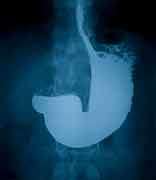(HealthDay) -- The majority of gastroesophageal reflux disease (GERD) patients who take twice-daily proton pump inhibitor (PPI) therapy, are able to successfully step down to management of heartburn with a daily dose of dexlansoprazole modified release (MR), according to a study published in the March issue of Clinical Gastroenterology and Hepatology.
Ronnie Fass, M.D., of the Southern Arizona VA Healthcare System in Tucson, and associates conducted a multicenter, single-blind study of 142 patients with GERD to determine if twice-daily PPI therapy for more than eight weeks could be phased down successfully to 30 mg once-daily dexlansoprazole MR and what the impact would be on health-related quality of life (QOL). Patients recorded heartburn in electronic diaries; heartburn was considered well-controlled if patients had an average of one symptom or fewer per week during the last four weeks of treatment. GERD-related symptoms and QOL were assessed using the Patient Assessment of Upper Gastrointestinal Disorders (PAGI) Symptom Severity Index and the PAGI-QOL, respectively.
The researchers found that, following step down from PPI therapy, heartburn remained well controlled in 125 patients (88 percent), and these patients were able to maintain their QOL and GERD-related symptom severity.
"Step-down management of GERD patients who have obtained heartburn symptom control on twice-daily dosing should be considered to reduce costs, possibly improve compliance, and reduce the risk of side effects associated with high-dose PPI use," the authors write.
Several authors disclosed financial ties to pharmaceutical and medical device companies, including Takeda, which funded the study and manufactures dexlansoprazole.
More information:
Abstract
Full Text (subscription or payment may be required)
Editorial
Journal information: Clinical Gastroenterology and Hepatology
Copyright © 2012 HealthDay. All rights reserved.


















